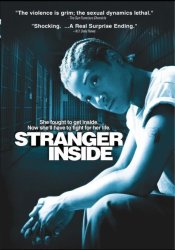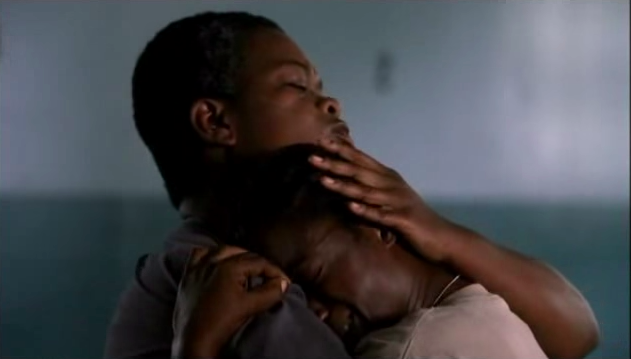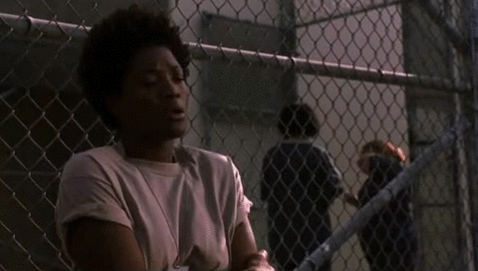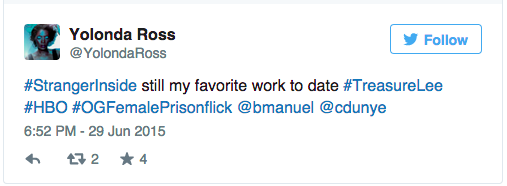HBO’s LGBT History: Stranger Inside (2001)
 Wednesday, July 15, 2015 at 6:30PM
Wednesday, July 15, 2015 at 6:30PM
Manuel is working his way through all the LGBT-themed HBO productions...
 Last week we looked at the master-class in acting that is If These Walls Could Talk 2: 1961 which was oddly followed by two other short films that, had I not written about them, most of you would not have remembered. Yes, all you need to know is that Vanessa Redgrave is resplendent in that initial segment. This week we look at precisely the type of experience that Ellen DeGeneres-produced lesbian PSA skirts. We’re headed to a female prison with Stranger Inside and director Cheryl Dunye is quite the guide. Guys, this might be the best new find in this whole rewatch series.
Last week we looked at the master-class in acting that is If These Walls Could Talk 2: 1961 which was oddly followed by two other short films that, had I not written about them, most of you would not have remembered. Yes, all you need to know is that Vanessa Redgrave is resplendent in that initial segment. This week we look at precisely the type of experience that Ellen DeGeneres-produced lesbian PSA skirts. We’re headed to a female prison with Stranger Inside and director Cheryl Dunye is quite the guide. Guys, this might be the best new find in this whole rewatch series.
Dunye’s film is a powerful and affecting film, timely even all these years later. About race. About guns. About feminism. About violence. About the prison system. About motherhood. About religion. About hypocrisy. About white supremacy. Why more people don’t talk about this film is beyond me (especially with Orange is the New Black having conquered pop culture the way it has). Let’s begin fixing that now...
Stranger Inside (2001)
[Why is this film so hard to find? Watch on YouTube. Get the DVD from Amazon.]
Directed by: Cheryl Dunye
Written by: Catherine Crouch & Cheryl Dunye
Starring: Yolonda Ross, Davenia McFadden, Rain Phoenix, Ella Joyce, Conchata Ferrell and Emily Kuroda.
The film opens with a celebration: it is Treasure’s (Ross) birthday. With a cigar in her mouth, Treasure watches as her fellow inmates jubilantly celebrate. One fellow inmate dancing provocatively for Treasure alone. There is a lived-in intimacy to their stolen glances, and when the party gets shut down by a CO and Treasure is called away to be informed she’ll be moved to a maximum security prison, we see Treasure and her friend exchange a brief moment of closeness that suggests more than just your regular prison-wife relationship. This is what’s wonderful about Dunye’s filmmaking, those small fleeting moments that encompass an entire history that would make a fascinating film in it of itself (if you haven’t seen The Watermelon Woman, you definitely should, if only to read frequent TFE podcast guest Nick Davis’s lucid take on it).
As it turns out, Treasure herself is behind her transfer. The maximum security prison she’s headed to is the place where she’s been told the mother she never met is locked up for life. All she has of this woman is a name (Brownie) and a faded photograph but she’s intent on recreating in prison what she was denied outside: a family. As she looks for Brownie (McFadden) and then later finds increasingly dangerous ways of getting close to her and prove her worth, Dunye is able to paint a sympathetic (though not quite unapologetic) picture of the ways systemic oppression sustains the very self-perpetuating circle of violence that leads so many women to prison. During Treasure’s mandatory group sessions, Dunye shoots Ross and the rest of the cast in a shaky, documentary style, further underscoring the authenticity that the entire film depends on. Stranger Inside is not unlike the photographs Treasure’s friend shoots with a DIY old-school polaroid camera throughout the film: a document of a fleeting moment that hopes to imagine a way out.

"You were damaged before you were born"
Prison, of course, proves itself to be as tricky a place to escape because of the way it becomes a state of mind. This is a place with rules of its own and gangs, “families,” and equally unstable support networks that depend on illicit (if not outright illegal) dealings are what keep the women alive. Indeed, Brownie’s newfound “family” emerges as the biggest obstacle between Treasure and her mother. It makes the inevitable violent ending (and its subsequent aftermath) all the more heartbreaking.
In Brownie (who has a prison wife of her own) and Treasure, Dunye creates two vivid character portraits that define and exceed labels like “lesbian,” “butch,” and even “mother” and “daughter.” The rhetoric of family, of community, and of (homo)sexuality is not easily parsed, it’s a fascinating entry in our increasingly varied list precisely because it is an LGBT-themed film that doesn’t flaunt but also doesn’t downplay its own tricky interest in queer characters. It lets them live, breathe, fuck even, without narratively asking them to account for their behavior or become subservient to it. That it's also great filmmaking with two talented leads at its center, well, that’s near miraculous. Anyone else seen it? Are you eager to?

Fun Awards Fact: Not a big awards player outside of festivals, Stranger Inside nevertheless was nominated for three Independent Spirit Awards (you know, back when they were actually Independent), including Best Director. Dunye lost to a little-known someone who went on to direct a behemoth of a trilogy about a certain dark crusader. But really, I just wanted to highlight the embarrassment of riches in LGBT media in 2001: at the San Francisco Film Festival, Dunye’s film shared the Best Narrative Feature Audience Award with Hedwig and the Angry Inch. That’s a stellar double feature right there, emblematic of the exciting work of queer filmmakers at the turn of the century.
Next week: We already made a pit stop and talked about the gay-themed episodes that HBO aired in 1998, but this wouldn’t be an LGBT history of the cable network if we didn’t give Six Feet Under its own entry. And so, we’ll be talking about “A Private Life,” (Watch on HBO Go) the penultimate episode of that series’ first season which aired in the fall of 2001. It’s a hell of an episode and a fitting entry point into the Fisher family’s vexed relationship with homosexuality.





Reader Comments (6)
Saw the movie when it originally aired with a Michael Stripe intro. Davenia McFadden for me will always be Rosie O'Donnell's rival in Mary Tyler Moore trivia.
I have a personal connection to Cheryl so I'm not entirely sure how objective I am about her work, which I love, including this film. It always pisses me off that more people aren't aware of her. (Director is a woman + African-American + lesbian + outspoken = you know the drill.)
Big fan of this one, and of Dunye in general.
Haven't seen it! Thanks for the Youtube link!
Must see.
I will definitely be watching this soon. The Watermelon Woman is such a unique and wonderful film that handles some odd subject matter really nicely.